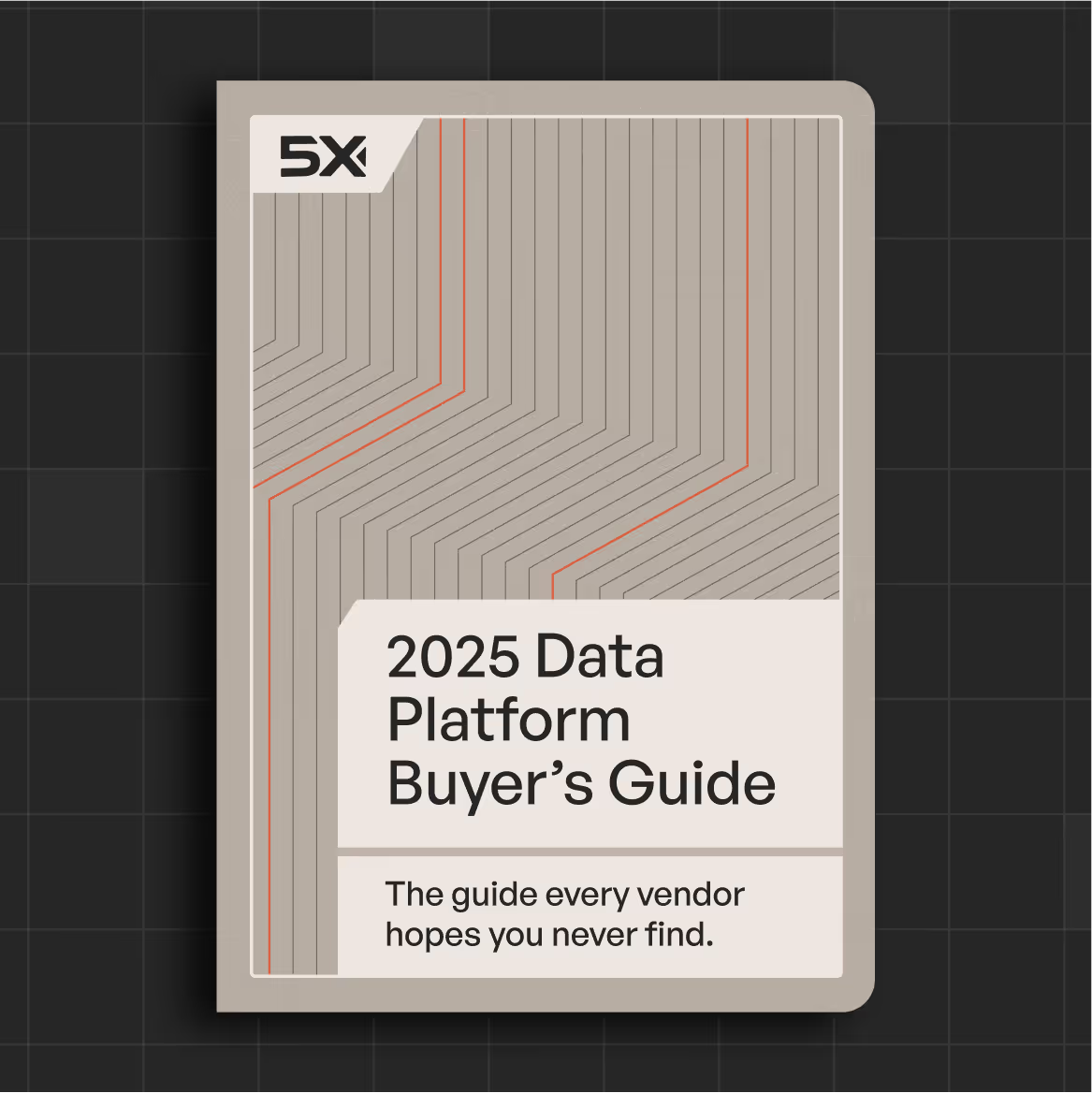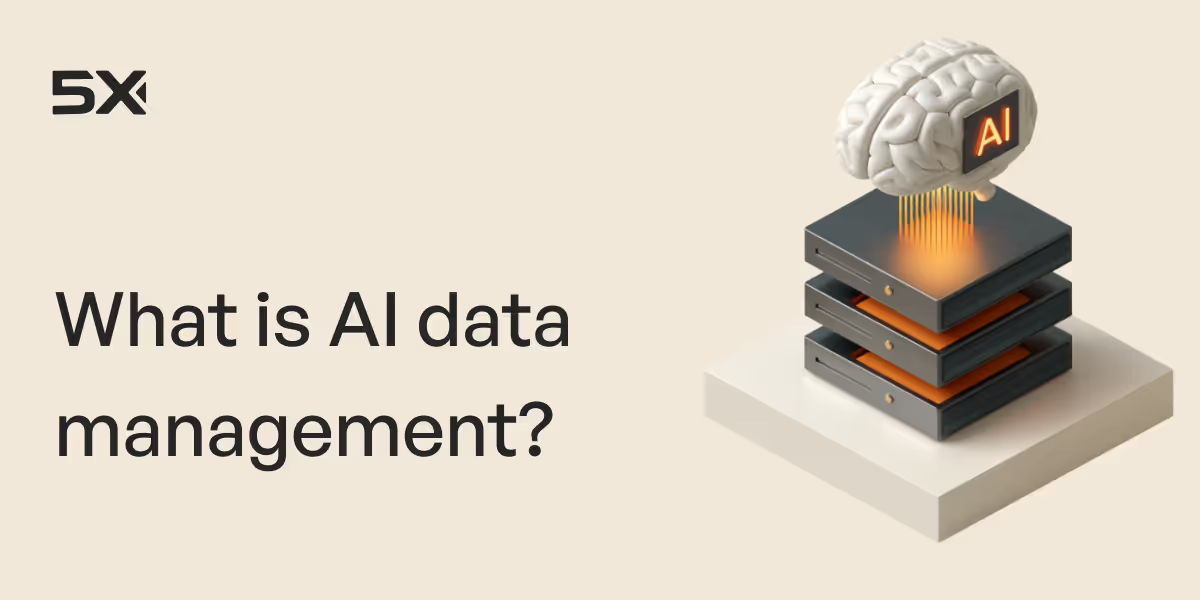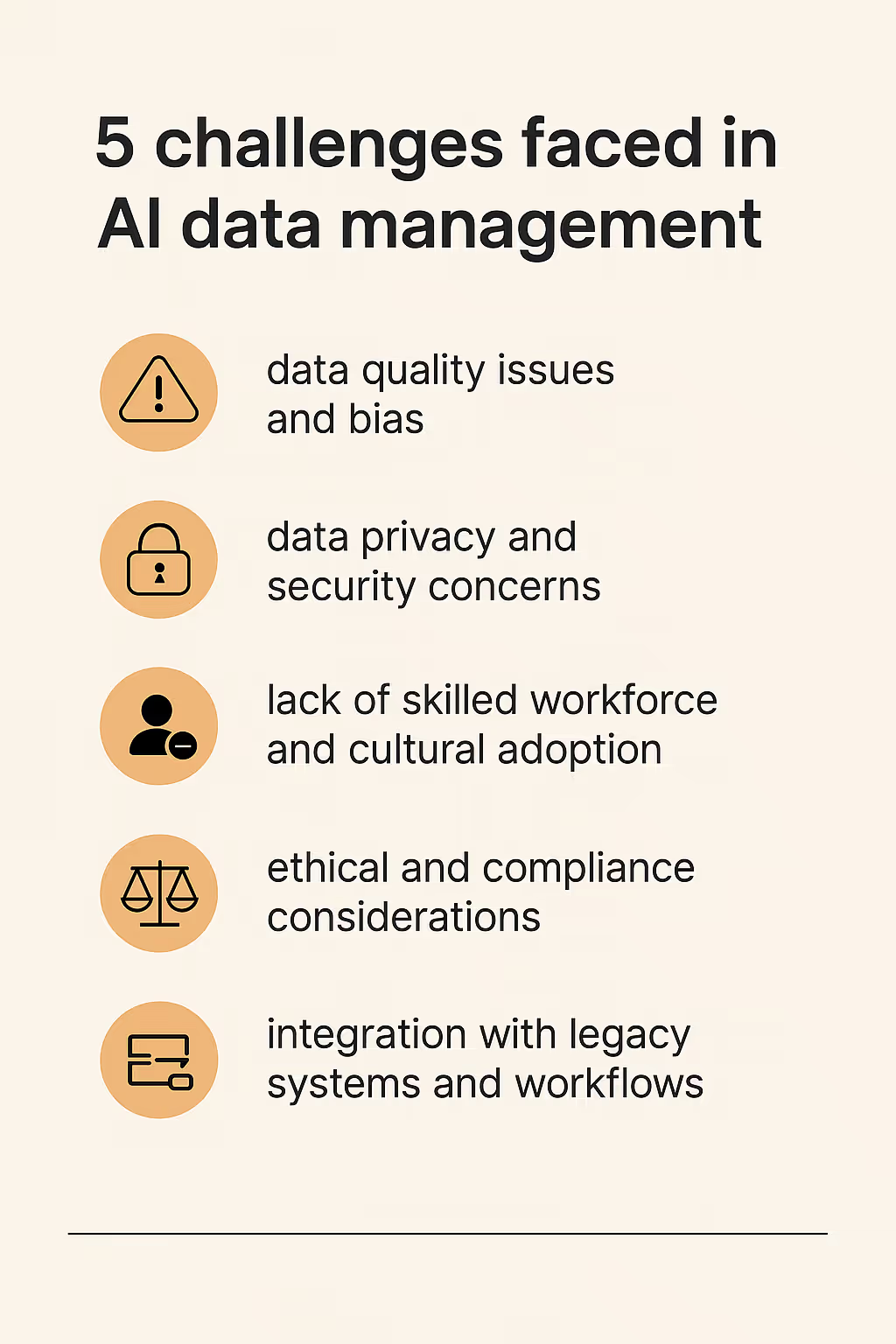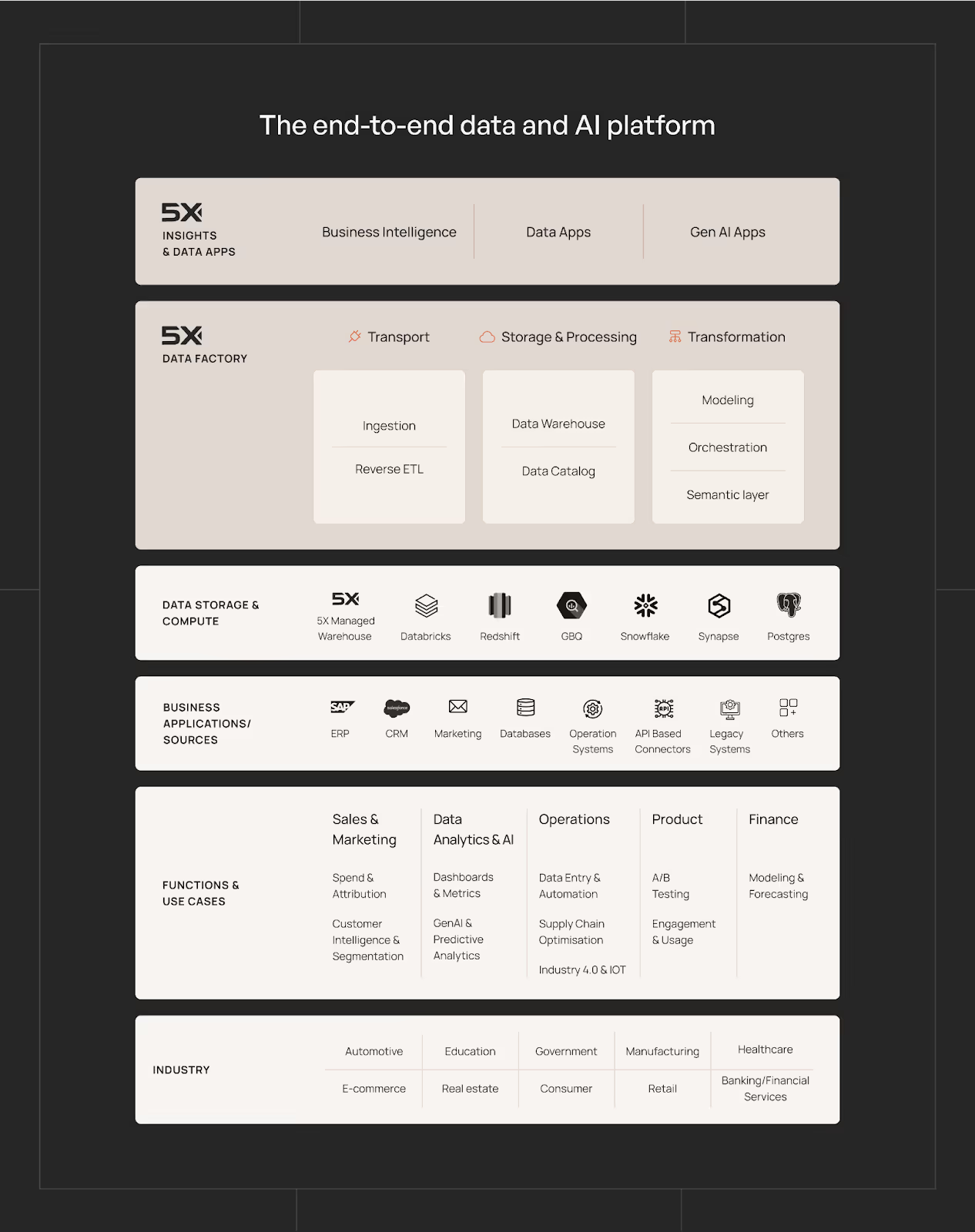What is AI data management?


.avif)
Table of Contents
TL; DR
- AI data management is about using AI itself to automate discovery, cleaning, pipelines, and governance so your data is always AI-ready
- Poor data quality costs companies millions each year; AI helps catch errors, fill gaps, and reduce risk at scale
- Use cases span automated cataloging, feature engineering, real-time streaming, integration across silos, and compliance monitoring
- Challenges include fragmented systems, data privacy, skills gaps, and legacy integration—but modern platforms can solve these
- 5X delivers an all-in-one data & AI platform: open-source core, no vendor lock-in, cloud-agnostic or on-prem deployment, enterprise-grade security, and predictable licensing
- With high-touch expertise and built-in governance, 5X helps you move from messy data to ai-driven outcomes without rebuilding from scratch
You can’t out-exercise a bad diet; you can’t out-algorithm bad data. AI data management is the nutrition plan—portioned, clean, and consistent—so every workout (experiment) compounds. Fewer hacks, fewer plateaus, and visible gains: higher model accuracy, faster cycle times, lower ops noise.
As AI pioneer Andrew Ng put it, “Data is food for AI,” and if that “food” is rotten, even the smartest AI will starve.
The way we manage data needs to evolve for AI to deliver on its promise.
This is where AI data management comes in. Instead of manual, error-prone data handling, AI-driven tools can automate and optimize each step, from real-time ingestion to quality checks.
This post will show you how AI data management works, real use cases and benefits, the challenges it helps overcome, and the best tools (and strategies) you can use.
What is AI data management?
AI data management is the practice of using artificial intelligence and machine learning techniques to manage, organize, and optimize data throughout its lifecycle.
In simpler terms, it means applying AI to data management itself. Instead of handling all your data tasks through manual coding or rigid rules, you use AI-driven tools to automate and enhance those tasks. This can include:
- Automating data collection and preparation: AI can streamline how data is gathered from various sources, perform initial cleaning, and even enrich data (for example, using NLP to extract structured info from text) without constant human intervention
- Smart data cleaning and quality control: Traditional data cleaning is labor-intensive, but AI systems can learn to detect errors, outliers, or duplicates and fix them. They validate formats, fill missing values with plausible estimates (even using synthetic data when appropriate), and generally boost data quality faster than any spreadsheet macros could
A lot of AI is the quality of the data, which is where our focus is right now. What's the internal data that we want to feed these models, and what are the use cases that we want to unlock?
~ Kiriti Manne, Head of Strategy & Data at Samsara
How Samsara’s Attribution Model Turns Data into Gold
- AI-driven data organization and discovery: AI helps classify and catalog data automatically. For instance, machine learning can tag data records or files by topic, sensitivity, or patterns, making it easier to discover what data your company has (and prevent “shadow data” lurking unmanaged). This is crucial because one-third of data breaches involve unknown “shadow” data, which cost ~16% more than average breaches
- Integrating and retrieving data efficiently: AI can learn the relationships between datasets, suggesting how to join data from different silos. It can also power smarter data queries. Modern AI data management often includes generative AI capabilities (like large language models) embedded in data platforms so that even non-technical users can retrieve insights with a simple question
- Strengthening data security and governance: Data management isn’t just about availability; it’s also about protection and compliance. AI assists here by monitoring for unusual data access patterns (potential breaches) and auto-applying policies
Also read: How AI can enhance revenue for your business?
6 Use cases for AI data management

Where does AI data management actually make a difference? It turns out AI can slot into nearly every phase of the data lifecycle. Here are some of the most impactful use cases and applications across industries:
1. Automated data discovery & cataloging
Companies deal with data flowing in from countless sources (databases, SaaS apps, IoT sensors, documents, etc.). AI helps automatically discover, index, and catalog these assets.
For example, AI-powered discovery tools can continuously scan your networks and cloud storage to find new datasets and metadata in near real-time. Instead of relying on someone to manually document a new data source, an AI catalog might tag it as “CRM_Contacts_Table – contains emails, phone numbers” or even flag it as containing PII.
This provides much-needed visibility. It not only prevents valuable data from remaining “hidden,” but also improves security (recall that shadow data = breach risk).
2. Data cleaning and quality improvement
Data needs to be considered and intertwined with AI and machine learning to really unlock meaningful value. data only becomes powerful when we are able to do that. And conversely, it reaches its full potential when we have high quality data.
~ Maddie Daianu, Senior Director, Data Science & Engineering, CreditKarma
Driving Financial Freedom with Data
AI excels at pattern recognition, including spotting what “looks wrong” in data. AI-driven data preparation tools can automatically detect anomalies, errors, or mismatches in datasets. Did an outlier revenue figure spike due to a comma in the wrong place? An ML model could flag it. Is the same customer appearing multiple times due to typos in their name? AI can deduplicate records by learning that “Jon Doe” and “John Doe” are likely the same person.
By one estimate, poor data quality costs businesses on average $12.9 million per year in inefficiency and mistakes. AI can cut those costs by catching errors that humans miss and doing it at scale.
3. Feature engineering and enrichment
For machine learning teams, a big chunk of time is spent engineering features—creating the right input variables from raw data. AI can assist here by suggesting new features or automating feature creation.
For instance, an AI system might analyze raw time-series data and automatically generate features like moving averages or frequency components that could improve a predictive model. Another example is using NLP to transform unstructured text into structured indicators (sentiment scores, key topics) that become model features.
4. Real-time data pipelines
In the era of streaming and IoT, many AI applications need data in real or near-real time. Think of fraud detection models that must react to transactions instantly, or recommendation engines that update with each user action. AI can optimize real-time pipelines by intelligently routing and processing data.
One example is using AI for event stream processing, where the system learns to prioritize certain data flows or detect complex event patterns (e.g. a sequence of user actions that likely indicate churn). Another example: AI algorithms managing cache or database writes to reduce latency for time-sensitive queries.
5. Data integration and accessibility
Most organizations struggle with data fragmentation; different teams and tools generate their own data silos. AI can act like a smart “bridge builder” between these silos. How? By automatically detecting relationships between datasets and even suggesting how to join them.
For example, AI in an integration tool might notice that two databases have a common field (say, “Customer ID”) and recommend linking records on that key. Some AI-enabled integration platforms can also infer transformations needed to make datasets compatible (like recognizing that “USA” in one system vs “United States” in another should be standardized).
6. Intelligent data security & compliance
As data volumes grow, so do security and privacy risks. AI is being deployed to strengthen data protection in several ways. One is anomaly detection for security. AI models monitor data access patterns and network flows to flag unusual activity (which could indicate a cyberattack or internal misuse).
Another is automated compliance checks: for instance, AI can scan data to find personal or sensitive information and ensure it’s handled according to regulations (GDPR, HIPAA, etc.). If a dataset contains EU customer data, AI can flag it so that appropriate consent or anonymization procedures trigger.
Managing data for AI is a journey, not a one-time project. Start with clear objectives (better data quality, faster ML experiments, etc.), and consider conducting a Data & AI Maturity Assessment to pinpoint where you are today.
5 Challenges faced in AI data management

If implementing AI in data management sounds straightforward, it’s not without hurdles. Many organizations attempting to infuse AI into their data processes encounter common challenges that need to be addressed:
1. Data quality issues and bias
Ironically, while AI can help fix data quality, it’s also highly sensitive to data quality. If you feed bad data into an AI system, you’ll get bad outcomes faster! Many companies have learned this the hard way: AI algorithms trained on inaccurate or biased data will simply amplify those errors.
Better AI isn't about more data; it is about the quality of data and its connectivity. We have assigned accountability to make sure that we just don't keep on saying the quality is bad, but keep improving it.
~ Anindita Misra, Global Director of Knowledge Activation & Trust, Decathlon Digital
How Decathlon uses data to optimize in-store operations
In fact, ensuring high-quality data is often cited as the #1 challenge in data initiatives. 64% of organizations say data quality is their top barrier to success. If data is incomplete, inconsistent, or full of duplicates, AI tools might struggle to make correct inferences. Worse, subtle biases in data (say, underrepresenting a customer segment) can lead to skewed model predictions.
Overcoming this challenge requires not just technology, but process: robust validation, retraining AI models on updated data, and sometimes incorporating human-in-the-loop to verify critical outputs.
2. Data privacy and security concerns
Introducing AI into data management means letting algorithms access and analyze large swathes of your data. Understandably, this raises privacy and security flags. Companies must ensure that AI systems comply with privacy laws and don’t expose sensitive information.
3. Lack of skilled workforce and cultural adoption
AI data management sits at the intersection of two domains—AI/ML and data engineering. There’s a notable skills gap here. It’s hard enough hiring good data engineers; finding people who also understand machine learning or vice-versa is harder. Many organizations don’t yet have the talent who can build and maintain AI-driven data infrastructure. A related challenge is cultural: some traditional IT and data management teams might be resistant to relying on AI recommendations (“can we trust the AI to do this?”).
4. Ethical and compliance considerations
As AI takes a bigger role in handling data, ethical questions inevitably arise. If an AI system is deciding which data to keep or discard, could it introduce unfair bias?
For example, if past data is biased against a group, an AI might inadvertently enforce that bias when cleaning or integrating data. There’s also the issue of transparency: regulators and stakeholders might ask, “How did this AI system decide what to do with our data?”
Ethical AI practices (such as fairness, accountability, transparency) are just as relevant in data management as they are in customer-facing AI applications. Organizations need to ensure their AI data management processes don’t discriminate or violate regulations.
Also read: 10 Best Data Management Tools [Expert Picks]
5. Integration with legacy systems and workflows
Few companies have the luxury of building an AI-driven data platform from scratch. Most have a patchwork of legacy databases, applications, and ETL scripts. Fitting AI into this ecosystem can be tough. You might have an old ERP system that doesn’t play nicely with modern APIs, or analysts who still love their Excel macros.
Implementing AI data management often means significant integration effort—connecting new AI tools with existing data warehouses, migrating some processes, or running AI in parallel to legacy systems until trust is built. This integration can incur additional cost and complexity in the short term.
The solution: an all-in-one data & AI platform

Modern AI initiatives fail not because the models are weak, but because the plumbing underneath is brittle. that’s exactly what 5X fixes.
5X is built as an AI-ready data platform that takes care of the unglamorous but mission-critical work: real-time pipelines, seamless integrations, governance, and security—all under one roof.
What makes it different:
- No vendor lock-in, open-source at the core: You’re not trapped in a proprietary ecosystem. 5X is built on best-of-breed open-source technologies, so you get enterprise reliability without the black-box premium. swap, upgrade, extend; you keep control
- Cloud agnostic + on-prem options: Whether you’re all-in on AWS, experimenting with Azure, hybrid on GCP, or need to keep workloads on-prem for compliance, 5X deploys in your environment
- Enterprise-grade security and compliance baked in: HIPAA, GDPR, SOC2, all covered. Security isn’t bolted on later; it’s woven into the pipelines and governance from day one
- Expertise included: 5X isn’t just software; it’s high-touch support from experts who’ve built and scaled modern data stacks. From implementation to ongoing optimization, your team gets a partner, not just a platform
- Predictable licensing model: Unlike consumption-based pricing that spikes as data volumes grow, 5X uses a transparent licensing model. Your costs are predictable, your margins protected, and your growth not penalized
FAQs
How can AI transform data management?

What is the future of AI and data management?

What are the best AI data management tools?

Building a data platform doesn’t have to be hectic. Spending over four months and 20% dev time just to set up your data platform is ridiculous. Make 5X your data partner with faster setups, lower upfront costs, and 0% dev time. Let your data engineering team focus on actioning insights, not building infrastructure ;)
Book a free consultationHere are some next steps you can take:
- Want to see it in action? Request a free demo.
- Want more guidance on using Preset via 5X? Explore our Help Docs.
- Ready to consolidate your data pipeline? Chat with us now.

How retail leaders unlock hidden profits and 10% margins
Retailers are sitting on untapped profit opportunities—through pricing, inventory, and procurement. Find out how to uncover these hidden gains in our free webinar.
Save your spot






%201.svg)


.png)






